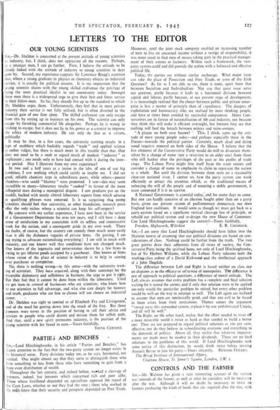OUR YOUNG SCIENTISTS
SIR,—Dr. Sheldon is concerned at the present attitude of young scientists ta industry, but, I think, does not appreciate all thereasons. Perhaps, as a younger man, I can go further. First, I believe the attitude to be closely linked with the attitude of industry to young scientists in days gone by. Second, my experience supports Sir Lawrence Bragg's assertion that, where a young graduate in physics or chemistry objects to industrial service, it is usually for political reasons. It is my impression that the young scientist shares with the young skilled craftsman the privilege of being the most practical idealist in our community today. Amongst these men there is a widespread urge to give their best and finest service to their fellow-men. So far, they already live up to the standard to which Dr. Sheldon urges them. Unfortunately, they feel that in most private industry their service is not fully utilised, but is often diverted to the financial gain of one firm alone. The skilled craftsman can only escape from this by setting up in business on his own. The scientist can only escape by forsaking commertial life altogether. Perhaps he is wrong in wishing to escape, but it does not lie in his power as a scientist to improve the ethics of modern industry. He can only do that as a citizen, politically.
It may be that, in a few cases, the university training results in a type of snobbery which foolishly regards " trade " and applied science as rather vulgar, but there is much more in this trouble than that. One does not need to be a snob to regard much of modern " industry " as unpleasant ; one needs only to have had contact with it during the interwar period. May I illustrate from my own experience?
In two and a half years as a junior in the labs, of one of our big combines, I saw nothing which could satisfy or inspire me. I did see good, reliable chemists kept in suboklinate posts, while others—poorer chemists—who could " blarney " were promoted. I saw—this may seem incredible to many—laboratory results "cooked" in favour of the more influential man during a managerial dispute. I saw products put on the market, backed with neatly altered laboratory reports from which adverse or qualifying phrases were removed. Is it so surprising that young 'scientists shoulefeel that university, or other foundation, research posts offer the only niches where a scientist can keep his self-respect?
By contrast with my earlier experience, I have now been in the service Of a Government Department for over ten years, and I still have a deep sense of satisfaction in my association with its selfless and constructive work for the nation, and a consequent pride in my own work. There are faults of course, but the country can remedy them much more easily than it d1 the dishonest vagaries of private firms. (In passing, I am not trying to. advocate nationalising everything.) I am still in touch with industry, and one knows well that conditions have not changed much. One knows of the ingenuity and perseverance shown by a few firms in trying to get inferior goods accepted by a purchaser. One knows of firms whose vision of the place of science in industry is to help in scoring over purchaser or competitor.
No, there is nothing wrong—in this sense—with the university training of scientists. They have acquired, along with their contempt for the miserable dishonesty and selfishness in business, the urge to put it right But they feel• that it cannot be done from within the laboratory. Until we get men, in control of businesses who are scientists, who know how to use scientists to full advantage, and who also care deeply for honesty and truth, graduates who are free to choose will not choose an industrial career. • Dr. Sheldon was right to remind us of Elizabeth Fry and Livingstone, and of the need for getting down into the muck of the fray. But those pioneers were never in the position of having to sell their advice and services to people who could distort and misuse them for selfish ends. And that, until a new spirit permeates industry, is the position of the young scientist with his bread to earn.—Yours faithfully,






















 Previous page
Previous page